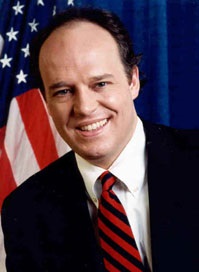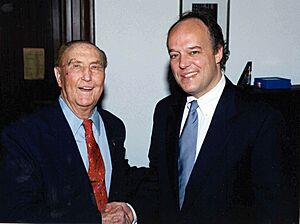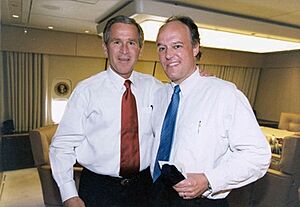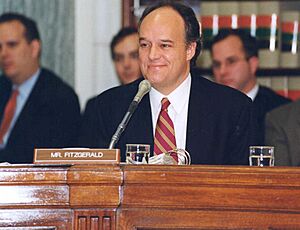Peter Fitzgerald (politician) facts for kids
Quick facts for kids
Peter Fitzgerald
|
|
|---|---|

Official portrait from the Biographical Directory of the United States Congress
|
|
| United States Senator from Illinois |
|
| In office January 3, 1999 – January 3, 2005 |
|
| Preceded by | Carol Moseley Braun |
| Succeeded by | Barack Obama |
| Member of the Illinois Senate from the 27th district |
|
| In office January 13, 1993 – November 16, 1998 |
|
| Preceded by | Virginia B. MacDonald |
| Succeeded by | Wendell E. Jones |
| Personal details | |
| Born |
Peter Gosselin Fitzgerald
October 20, 1960 Elgin, Illinois, U.S. |
| Political party | Republican |
| Spouse | Nina Fitzgerald |
| Residences | Inverness, Illinois (1960–2005) McLean, Virginia (2005–present) |
| Alma mater | Dartmouth College (BA) Aristotelian University University of Michigan (JD) |
Peter Gosselin Fitzgerald (born October 20, 1960) is a former American lawyer and politician. He served as a United States Senator for the state of Illinois from 1999 to 2005. As a member of the Republican Party, he was known for being a "maverick," which means he was willing to vote against his own party's ideas if he disagreed with them.
In 1998, Fitzgerald won the Senate election against the person holding the office at the time, Carol Moseley Braun. This was a big victory, as he was the first Republican to win a U.S. Senate race in Illinois in 20 years. Before becoming a U.S. Senator, he was a member of the Illinois State Senate.
After his term in the Senate ended, he was succeeded by Barack Obama. Fitzgerald then retired from politics and moved to McLean, Virginia, with his wife. His father was a successful banker, and in 2007, Peter Fitzgerald started his own bank called Chain Bridge Bank.
Contents
Early Life and Education
Peter Fitzgerald was born in Elgin, Illinois, and grew up in Inverness, Illinois, a suburb of Chicago. He was one of five children.
For his education, he went to Portsmouth Abbey School, a Catholic boarding school, and graduated in 1978. He then attended Dartmouth College and graduated in 1982. He also studied in Greece at Aristotelian University and later earned a law degree from the University of Michigan in 1986.
His family was involved in the banking business for a long time. His father, Gerald, built and bought many banks around the Chicago area.
Political Career
Illinois State Senator
Fitzgerald was first elected to the Illinois State Senate in 1992. He was part of a group of five conservative state senators who were known for challenging the leaders of their own Republican party. Because of this, they were nicknamed the "Fab Five."
1998 U.S. Senate Election
In 1998, Fitzgerald decided to run for the U.S. Senate. He wanted to challenge the current Democratic senator, Carol Moseley Braun. First, he had to win the Republican primary election against Loleta Didrickson, who was supported by many top party leaders. Fitzgerald won the primary by a small margin.
In the main election, Fitzgerald faced Moseley Braun. It was a close race, but Fitzgerald won with just over 50% of the vote. He was the only Republican challenger in the entire country to defeat a sitting Democratic senator that year.
Time in the U.S. Senate

As a senator, Fitzgerald was known for standing up for what he believed in, even if it made him unpopular. One famous moment was when he used a filibuster (a very long speech used to delay a vote) to block a spending bill. The bill included money for the Lincoln Presidential Library. Fitzgerald was worried that the project would cost too much and that the money would not be spent properly.
Another time, after the September 11, 2001 attacks, Congress passed a bill to give money to major airlines that were having financial problems. Fitzgerald was the only senator to vote against it. He gave a speech called, "Who will bail out the American taxpayer," arguing that the plan would not solve the airlines' problems.
Fitzgerald held conservative views on many topics. However, he sometimes disagreed with his party on other issues. For example, he was against oil drilling in the Arctic National Wildlife Refuge to protect the environment. He also supported laws for "reasonable" gun control and reforming how political campaigns are funded.
Fighting Corruption
During his time in the Senate, Fitzgerald worked to fight political corruption in Illinois. He insisted that an outside lawyer, Patrick Fitzgerald (no relation), be appointed to investigate government officials. This led to investigations of wrongdoing by politicians from both parties, including former governors George Ryan and Rod Blagojevich.
Because he often went against his own party's leaders, Fitzgerald did not have their support to run for reelection. He decided to retire after his first term. The Republican party chose Jack Ryan to run for his seat, but Ryan later withdrew from the race for personal reasons. The party then chose Alan Keyes as a last-minute replacement. Keyes lost the election to Barack Obama. Many people believe that if Fitzgerald had run for reelection, he might have won.
Life After Politics
After leaving the Senate, Fitzgerald founded Chain Bridge Bank, N.A. in McLean, Virginia, where he serves as the Chairman. He is also on the board of the National Constitution Center in Philadelphia, a museum about the U.S. Constitution.
 | Toni Morrison |
 | Barack Obama |
 | Martin Luther King Jr. |
 | Ralph Bunche |



